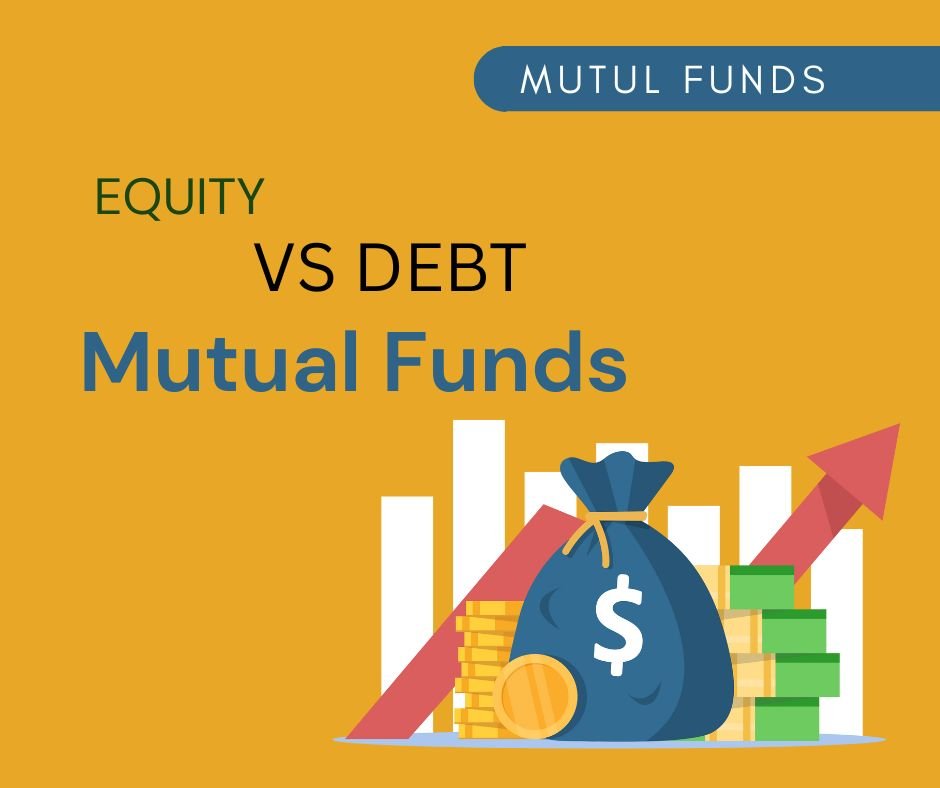Mutual funds have become a go-to investment option for millions of Indians. They offer diversification, professional management, and access to a wide variety of assets. Among the most popular types are Equity Mutual Funds and Debt Mutual Funds. But how do you decide which one is right for you?
Let’s explore both in-depth and understand the key factors that can help you make the right choice.
Equity Mutual Funds: High Growth, Higher Risk
Equity mutual funds invest most of their corpus in shares of publicly listed companies. The goal is capital appreciation over time, meaning your investment grows as the companies in the fund grow.
When should you choose Equity Funds?
If your goal is wealth creation over the long term (5+ years)
If you’re saving for goals like retirement, buying a house, or children’s education
If you’re comfortable with market volatility (prices rising and falling sharply)
If you’re young and have time on your side to ride out market fluctuations
Example:
Let’s say you invest ₹1,00,000 in an equity mutual fund with an average annual return of 12%. Over 10 years, that can grow to nearly ₹3,10,000 — thanks to compounding.
Debt Mutual Funds: Stability with Predictable Returns
Debt mutual funds invest in fixed-income securities such as government bonds, corporate bonds, money market instruments, and debentures. These funds are less volatile and offer relatively stable returns.
When should you choose Debt Funds?
If you’re looking for capital preservation rather than aggressive growth
If you want to park surplus money for short-term goals (1–3 years)
If you need liquidity with lower risk
If you’re nearing retirement or want lower exposure to market ups and downs
Example:
You invest ₹1,00,000 in a debt fund that yields 6.5% annually. In 3 years, your money grows to around ₹1,21,000 with minimal fluctuation.
Taxation: An Important Factor
Another key factor in deciding between equity and debt funds is taxation.
Equity Funds Taxation:
Short-Term Capital Gains (STCG): If held for less than 1 year, taxed at 15%.
Long-Term Capital Gains (LTCG): If held for more than 1 year, gains over ₹1 lakh taxed at 10%.
Debt Funds Taxation:
Taxed as per your income tax slab (since 2023, indexation benefits are no longer available).
Ideal for those in lower tax brackets for short-term goals.
Risk Appetite: Know Yourself Before You Invest
Understanding your risk appetite is crucial before investing in any mutual fund.
Aggressive Investors: Can take high risk for high returns — Equity funds are ideal.
Moderate Investors: Want a balance between safety and growth — Consider hybrid or balanced funds.
Conservative Investors: Prefer safety and stable income — Debt funds work best.
What About Hybrid Mutual Funds?
If you’re confused between the two, hybrid mutual funds can be a smart middle ground. These funds invest in both equity and debt in varying proportions, providing a mix of growth and stability.
Types of Hybrid Funds:
Aggressive Hybrid Funds (65–80% equity)
Conservative Hybrid Funds (80–90% debt)
Balanced Advantage Funds (dynamic allocation between equity and debt)
These funds automatically adjust the equity-debt mix based on market conditions, offering a good option for new or unsure investors.
How to Make the Right Choice?
Define Your Goal: Are you investing for growth, income, or safety?
Set Your Timeline: Equity funds for long-term, debt funds for short-term.
Evaluate Your Risk Profile: Can you handle market ups and downs?
Understand Tax Implications: Know how returns are taxed to plan better.
Consult a Financial Advisor: Personalized advice can go a long way.
Final Words: Don’t Just Pick — Plan
Choosing between equity and debt mutual funds isn’t just about picking one over the other. It’s about understanding your personal financial situation and creating a strategy that works for you.
Many successful investors use a combination of both to balance risk and reward. Equity funds help them grow wealth, while debt funds protect their capital.
Remember, the best investment strategy is the one that aligns with your goals, your timeline, and your peace of mind.



















